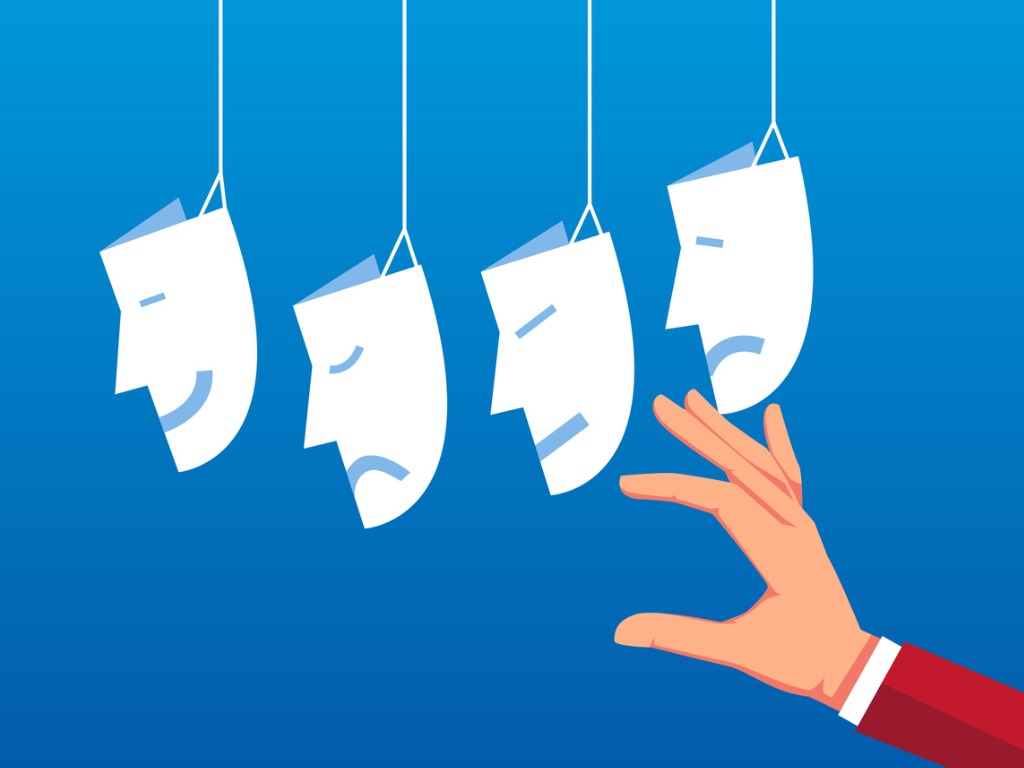
Thom Dennis explains why we have always worn masks and how COVID-19 has further shaped them
Wearing a mask has never been more important; it is saving lives globally. But in business, at home and socially, we already wear many masks. These vary according to the multiple roles that we play in our lives, from lawyer to mother to wife to cleaner to runner.
Why we all wear a mask at work and always have
1. Our language demonstrates how subliminally we acknowledge this
We often use phrases such as ‘saving face’, or ‘losing face’, ‘making a face’, or ‘putting on a brave face’. You can ‘set your face against’ someone or something and we ‘face up’ to challenges, or we ‘face them down’. Some women ‘put on their face’ before leaving the house.
2. We wear a mask to conform
In very corporate environments (for example, law) we wear a mask to conform rather than recognise and celebrate our differences. The importance of diversity and equality can easily be forgotten if we are all trying to wear the same clothes, behave in the same way and wear the same mask.
3. We wear masks to get ahead at work
Having to fit in to get promotion and not be judged fully on our work is frustrating at best and soul destroying at worst. This has been an issue for some successful women who have got to the top of their profession but have felt that they had to hide part of their true character, identity, femininity and circumstances.
4. We wear masks to avoid rejection
Some of us switch between masks to gain approval and minimise rejection from the group or other individuals. It is when the line between who we really are and the roles we play is blurred, or we are forced to play a role we don’t want to, that problems may occur.
5. We wear masks when being challenged or in times of adversity
This can make us feel stronger and more able to achieve our goals. The more difficult the circumstances, the more likely we will grin and bear it rather than checking in with our feelings. Over a longer period, this requires a lot of energy and will sometimes force us to supress who we are and can have a poor effect on mental health.
6. Masks make us seem one-dimensional
Sometimes we see colleagues as simply the ‘accountant’, ‘IT geek’, ‘maintenance man’, or ‘MD’. Typecasting makes us see others as merely a label, ignoring entirely the substance and dimensions of the individual.
7. Looking through our own lens
Making a quick judgement about someone at work may lead to poor snap decisions about who they really are. This is particularly destructive when we are talking about people who don’t look or act like us. Rather than treat someone as we would wish to be treated, we should treat that person how they want to be treated. Challenge yourself to think deeper and remain open to getting to know them.
8. Temporary masks can become permanent
The more we wear a mask, the more they can permanently shape us. On the one hand this can mean we lose our real sense of self, but conversely taking on a role that requires us to push ourselves a bit out of our comfort zone can sometimes be character and career building.
How COVID-19 Has Shaped Our Masks
We are protecting one another’s lives by wearing a face-covering mask. Some of us are choosing to show our personalities through our masks, but many aren’t expressing themselves in this way and are wearing black or surgical masks.
Feelings of constraint, concealment and claustrophobia are common complaints. For some, wearing masks can evoke feelings of anxiety and panic. People may feel trapped by the mask or feel more self-conscious. While ultimately wearing a face mask saves lives, it is important to recognise these and other difficulties to encourage compliance with wearing masks.
1. Communication problems
Only being able to see each other’s eyes builds an additional social barrier and limits personal cues and facial expressions. We rely almost entirely on sound and eye communication, requiring us to speak louder. This affects tonality in the workplace with loud speech sometimes being received as unintentionally aggressive or rude. This is all in addition to the fact that we can’t touch people or get too close to them.
2. What happens when we meet someone new?
What unconscious decisions are we making as we try to make sense of what we are seeing? Our brains are constantly trying to understand by relating the information we receive in the moment with previous experiences. It’s difficult to relate to someone when there is nothing to relate them to.
3. Working from home means blurred lines
Many business workers used to wake up and go into work every morning. Now some of us work in a back room, kitchen or home study. Switching into our work role at home can be tricky because we are likely to need to multitask more, such as help with the children, and we’ve lost the gap in which we used to switch between our roles – now we simply walk from one room to another. Blurred lines often increase stress levels.
4. Working from home can increase feelings of vulnerability
Those whose mask provided some protection at work, such as a uniform like a suit or a doctor’s white coat, may feel more vulnerable. Wearing pyjama bottoms whilst attending a Zoom meeting can change also change mindsets significantly.
Conclusion
In our research we have found that people who are given a mask to wear and have been told the character of the mask, find it quite easy to act that character. The 1994 film “The Mask” is a graphic depiction in which timid bank clerk Stanley Ipkiss, played by Jim Carrey, is too gentle, and is unable to handle confrontations in his life. He finds a mask which depicts Loki, the Norse god of mischief and when he puts it on, he becomes his inner cartoon self. Masks do have this effect of releasing people to act out a different, more authentic self.
One exciting development is that a lot of businesses have risen to the challenges, shifted quickly, made the best out of the situation and focused well on their priorities. This includes seeing what their people’s strengths (and weaknesses) are and being more understanding of their personal circumstances and life roles.












